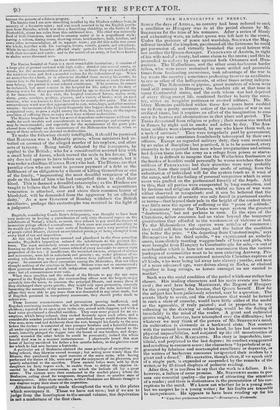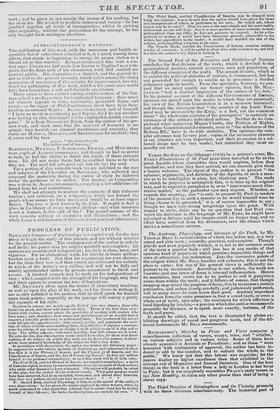THE MANITSCRIPTS OF ERDELY.
SINCE the days of Arrt LA, no country had been reduced to such a condition as Hungary was in at the period chosen by Mr. STEPHENS for the time of his romance. After a series of bloody and exhausting wars, an infant queen was left heir to the crown. Under the pretence of peace and wardship. SOLYMAN the Mag.
nificent invaded the kingdom, garrisoned all the fortresses he could
get possession of, and virtually banished the royal heiress with her mother the Queen-dowager. FERDINAND of Austria, in right
of his wife and of a treaty, had some claim to the crown ; and this he proceeded to eaforca by arms against both Ottomans and Hun- garians. The Wallachians, and the other semi-barbarous border tribes, who were never restrained in more settled and peaceable times from freebooting excursions, took advantage of the war to lay waste the country ; sometimes professing to serve as auxiliaries to one or other of the belligerents, at other times acting indepen- dently. The Bohemians or gipsies, great numbers of whom were (and still remain) in Hungary, the banditti rife at that time in many Continental states, and the serfs whom war had deprived of every thing except life, combined further to harry the coun- try, either as irregular partisans or avowed robbers. The Mi-
litary Memoirs published within these few years have enabled us to form a pretty accurate notion of the miseries of war in our civilized times, but it requires an effort of the imagination to cons ceive its horrors and abominations in that place and period. The Turks devastated from religion or policy ; their course was marked in flames by night and in smoke and ashes by day. The Aus- trian soldiers were characterized, by' one who knew them well, as a mob of outcasts.* They were irregularly paid by government, and the pay was sometimes fraudulently intercepted by their own officers. Except as regarded military duty, they were restrained by no rules of discipline; but practised, it is to be assumed, every enormity to be expected from men whose irregularities and crimes had driven them into the army as a refuge front prison or starva- tion. It is difficult to imagine that the Wallachian freebooters or the hordes of banditti could personally be worse wretches than the soldiers of FERDINAND; but their atrocities were very probably greater, from their rapid and irregular mode of acting, from the substitution of individual will for the system (such as it was) of the camp, and for the feeling of personal vengeance which in some cases was grafted on the professional ferocity of the heydo. Add to this, that all parties were exasperated by long contention, and by factious and religious differences, whilst no laws of war were either observed or recognized; and it can be believed that the merest semblance of security was only found in garrisoned castles or towns—that beyond their pale in the height of the contest there was little save the agony of suffering or the "peace of solitude." To inanimate nature the Turks were upon system the greatest " destructives," but not perhaps to man. In the eyes of the Christians, fellow creatures had no value beyond the temporary gratification they afibrded to the wantonness of violence or lust. To the Mahomedans the species were articles of commerce; they could sell them to advantage, and the better the condition the better the price. " On departing from Constantinople," says BUSREQUIUS in his third epistle, we experienced an unlucky omen, immediately meeting waggon-loads of boys and girls, who were brought from Hungary to Constantinople for sale,—a sort of merchandise which is here not more uncommon than the various packages of commodities wont to be seen entering Antwerp. Pro- ceeding onwards, we encountered miserable Christian captives of all kinds, who were being led away into slavery ; youths, and men of a more advanced age, were driven along in flocks, or chained together in long strings, as horses amongst us are carried to market."
Such was the social condition of the period which our author has chosen. His leadino.° characters and his main events are histo- rical; the real hero being Martinuzzi, the Regent of Hungary for the young Queen; the heroine, that Queen herself. How far the subject has been judiciously selected, may be a question. The events likely to occur, and the characters that would be formed in such a state of anarchy, would have little either of the useful or the agreeable, if truly painted ; and in proportion to any softening in the drawing or colouring, would be the feeling of incredulity in the mind of the reader. A great and cultivated genius might, however, have triumphed over the difficulties; but whatever we may think of the powers of Mr. STEPHENS'S mind, its cultivation is obviously in a backward state. Not content with the natural horrors ready to his hand, he has had recourse to physical impossibilities, and conjured up the old monstrosities of the followers of Mrs. RADCLIFFE. His story is improbable, fear- tificial, and perplexed to the last degree; its conduct exaggerated and revolting to common sense; the characters " hyperbolical or ag gravated by fabulous and unexampled excellence or depravity, as the writers of barbarous romances invigorated their readers by a giant and a dwarf." His narrative, though clear, if we speak only of a single part, is expanded or suspended by the remarks of the writer, or by ill-timed displays of pedantic reading. After this, it is needless to say that the work is a failure. It is, however, a failure of some promise. Mr. STEPHENS seems to pos- sess one essential quality—the power of attracting the attention of a reader; and there is distinctness in the presentation of his con- ceptions to the mind. We know not whether he is a young man, but we suspect he is a young writer ; for his faults are traceable to inexperience. He appears to have been reading up for his • "Cum fete perditorum hominum.”--Bess weirs, Ezdawatio.
work ; and he gives us not merely the cream of his reading, but the skim too. He wished to produce richness and variety—he has jumbled together all kinds of incongruities; whilst in striving after originality, without due preparation for the attempt, he has only brought forth mishapen abortions.



























 Previous page
Previous page